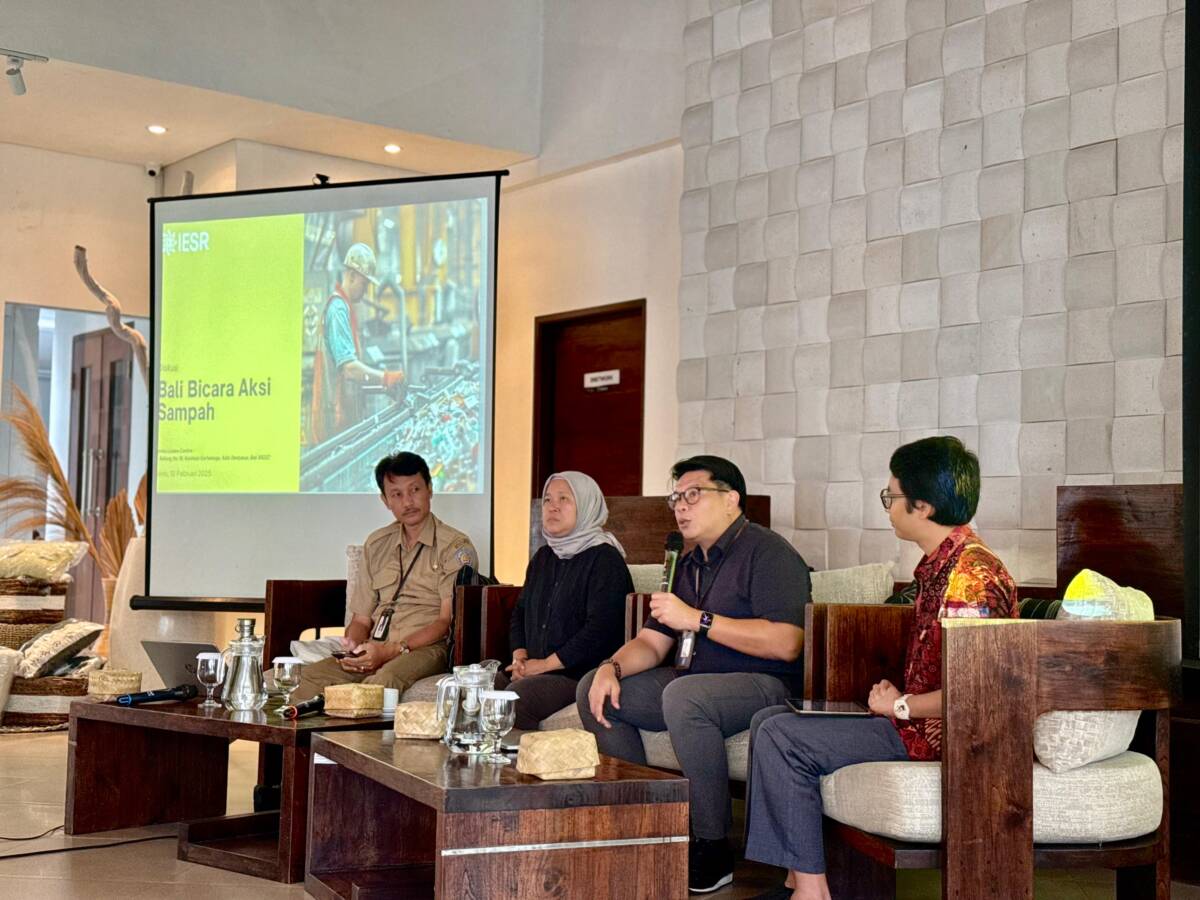Bali, February 11, 2025 – Bali’s waste management crisis requires immediate priority handling to prevent environmental, social, and economic impacts, which are detrimental to the Balinese people. This is one of the conclusions of the Bali Talks Waste Emergency Discussion organized by the Institute for Essential Services Reform (IESR), which is a member of the Bali Coalition for Zero Net Emissions, in collaboration with the Bali Provincial Government on Monday (10/2). In the short term, there needs to be a solution to overcome the full Suwung landfill so that it does not sacrifice the broader public interest.
Based on data from the National Waste Management Information System (SIPSN), waste generation in Bali Province in 2024 will reach 1.2 million tons. Denpasar City is the most significant contributor, with around 360 thousand tons of waste, with organic waste from food waste and wood branches dominating, reaching 68.32 percent.
IESR Executive Director Fabby Tumiwa said that from 2000 to 2024, waste generation in Bali increased by 30 percent. The causes of increased waste generation include a lack of awareness of waste management in most communities, including tourists visiting Bali. In addition, although district and city governments have regulations related to waste (such as waste sorting), enforcement of regulations and limited waste management infrastructure, as well as consumptive lifestyles with the use of disposable plastic packaging, are still contributing to the increasing volume of waste.
“The increase in waste generation, not accompanied by the ability to manage and the limited availability of waste infrastructure in Bali, has caused this facility to no longer be able to accommodate the increasing volume of waste,” Fabby said.
Fabby said that overcoming the waste problem requires a holistic and integrated approach with an emphasis on the circular economy, namely law enforcement, waste infrastructure development, especially landfills, providing economic incentives/disincentives, and mobilizing community participation to reduce waste, and processing organic waste at the source or the community level. This includes encouraging producers to reduce the use of plastic packaging. Meanwhile, consumers are encouraged to adopt a lifestyle that does not rely on plastic and other single-use plastic products and to reduce and segregate waste. He also explained that while waste-to-energy options are available, waste-to-energy (WtE) investments are costly and can strain local government finances. Therefore, reducing waste at the source and processing level is the most economical solution.
“There is no single solution that can solve Bali’s waste problem. It takes an integrated and comprehensive approach, involving all parties from the community, government, and industry. In addition, it is necessary to instill a circular economy mindset and waste management responsibility in the community, as waste processing in Indonesia is very expensive, reaching $100/ton. Therefore, waste reduction is the cheapest option,” Fabby said.
I Made Dwi Arbani, Head of the Division of Waste Management, Hazardous Waste, Pollution Control and Environmental Damage, DKLH Bali Province, said Bali is facing significant challenges in waste management, including overcapacity in landfills, limited available land, and a yearly increase in waste volume. Bali is transitioning from a linear waste management system reliant on landfills to a sustainable circular economy to address these issues. One of the key objectives outlined in the Bali Economic Kerthi Roadmap 2045 is to achieve 100 percent waste management.
“This includes reducing waste through sustainable lifestyles, such as shopping by bringing their containers from home, reusing recycled products, and seeking waste processing into compost, including the use of BSF (Black Soldier Fly) larvae technology to process organic waste, waste to energy through the utilization of waste into biogas, and increasing the capacity of waste processing facilities closer to the community, including the construction of Reduce-Reuse-Recycle Waste Processing Sites (TPS3R) and Integrated Waste Processing Sites (TPST) in various regions,” said Dwi Arbani.
Meanwhile, the Director of the Bali Environmental Education Center (PPLH), Catur Yudha Hariani, explained various solutions to handling waste. According to her, regulations that clarify the roles of the government, traditional villages, communities, the private sector, and law enforcement related to waste management are needed in the short term. In addition, collaborative education of the public by involving the government, communities, NGOs, academics, and the private sector is also necessary.

